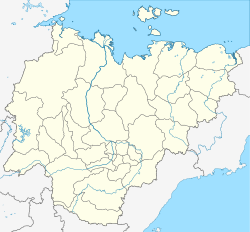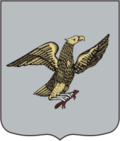Yakutsk
city
|
||||||||||||||||||||||||||||||||||||||||||
|
||||||||||||||||||||||||||||||||||||||||||
|
||||||||||||||||||||||||||||||||||||||||||
| List of cities in Russia | ||||||||||||||||||||||||||||||||||||||||||
Yakutsk ( Russian Яку́тск , Yakut Дьокуускай / Djokuuskaj ) is the capital of the Sakha Republic (Yakutia) in the Russian federation of the Far East . It has 269,601 inhabitants (as of October 14, 2010) and is located on the Lena River . The city has a climate similar to that of Oymyakon , which is almost 700 kilometers away , the cold pole of the inhabited areas of the world, and is therefore considered the coldest city .
geography
Yakutsk is the capital of Yakutia and is located on the Lena River . The distance to Moscow is just under 4900 kilometers (as the crow flies) and the time difference is six hours. The extreme climatic conditions represent a challenge in many ways. For example, most houses have to be built on concrete stilts so that they do not destabilize the underlying permafrost through thawing. In order to obtain drinking water from groundwater, wells have to be drilled that break through the hundreds of meters thick permafrost layer. Today, however, the water is mainly taken from the Lena. Many engines run continuously in winter, otherwise they would be damaged due to the outside temperature or would not start in the morning at temperatures below −50 ° C. Depending on the type of school, school-free is only below −45 ° C.
climate
The climate in Yakutsk is extremely continental: in January, the coldest month of the year, the mean temperature is −43.2 ° C. In summer, on the other hand, temperatures often rise to over 30 ° C (in rare cases +38 ° C were measured). At 18.8 ° C, the July mean is even higher than the corresponding value in Germany (approx. 18 ° C).
|
Average monthly temperatures and rainfall for Yakutsk
Source: wetterkontor.de
|
||||||||||||||||||||||||||||||||||||||||||||||||||||||||||||||||||||||||||||||||||||||||||||||||||||||||||||||||||||||||||||||||||||||||||||||||||||||||||||||||||||||||||||||||||||||||||||||||||||||||||||||||||||||
history
The city emerged in the middle of the 17th century from an ostrog , a settlement surrounded by a palisade fence , as it was founded in many places during the course of the Russian conquest of Siberia . This ostrog was built on the right side of the Lena in 1632 and relocated to the left in 1643.
In the first century after the city was founded, Yakutsk was almost exclusively inhabited by Russians. From the middle of the 18th century, however, Yakuts also settled in the city. In the 19th century they made up a good third of the population.
Since its inception, Yakutsk has been the starting point for a variety of expeditions to explore Siberia. During the course of this period, Semjon Deschnjow , Vitus Bering and Ferdinand von Wrangel, among others, stayed in the city .
During the Russian Civil War , Yakutsk was captured by the White Army in the summer of 1918 and remained under their rule until December 1919.
In 2004 the urban settlements of Kangalassy and Marcha were incorporated into Yakutsk.
Population development
| year | Residents |
|---|---|
| 1897 | 6,535 |
| 1926 | 10,558 |
| 1939 | 52,882 |
| 1959 | 74,330 |
| 1970 | 107,617 |
| 1979 | 152.368 |
| 1989 | 186,626 |
| 2002 | 210,642 |
| 2010 | 269,601 |
Note: census data
Economy and Infrastructure
The connection to the Russian road network is only intermittent, as the M56 trunk road from Newer via Tynda arrives on the right bank of the Lena (Nizhny Bestjach settlement), but the city is on the left of the Lena. The traffic runs by ferries in summer and across the ice in winter. In spring and autumn, depending on the ice situation, the river cannot be crossed. During this time, Yakutsk can only be reached via Yakutsk Airport (YKS). The Lena is only navigable for four months a year, which has an impact on the transport of bulk goods.
In addition to marshrutka (regular taxis), 16 bus routes carry the inner-city traffic. Its operation was outsourced to a private company in 2011.
A railway connection to the Baikal-Amur Mainline and the Trans-Siberian Railway , the Amur-Yakut Mainline , has been under construction for several years, but the completion is repeatedly delayed for financial reasons. Regular passenger service is currently ending in Tommot , the end of the line for (provisional) freight traffic is in Verkhnyaya Amga . The railway connection from Yakutsk requires a huge bridge over the Lena, which in the area of the city reaches a width of up to 10 km during the spring floods. The bridge should therefore be built 40 km away, where a length of 3 km is sufficient.
Yakutsk is the headquarters of Yakutia Airlines , a regional airline. The population growth despite the extreme weather conditions is mainly due to the raw materials in the vicinity. The Yakutsk region mines about a fifth of the world's diamonds.
Scientific and cultural institutions
In Yakutsk there is a seat of the Yakut Academy of Sciences and the Siberian branch of the Russian Academy of Sciences . Yakutsk has a university and various specialized colleges .
There is a local history museum, a national museum of fine arts and at the university a museum of archeology and ethnography. The Jew's Harp Museum has an international collection of Jew's Harps and organizes concerts for the Jew's Harp Khomus , which is an essential element of the national musical culture.
Sports
The city's football club, Jakutija Jakutsk , played in the 2nd Division East in the 2015/16 season . The World University Boxing Championships 2014 were held in Yakutsk.
Town twinning
-
 Changwon , South Korea
Changwon , South Korea
-
 Harbin , People's Republic of China
Harbin , People's Republic of China
-
 Fairbanks , Alaska , United States
Fairbanks , Alaska , United States
-
 Murayama , Japan
Murayama , Japan
-
 Yellowknife , Northwest Territories , Canada
Yellowknife , Northwest Territories , Canada
sons and daughters of the town
- Jelena Kon (1893–1968), publicist and literary critic
- Yuri Shevchenko (* 1947), politician and physician
- Irek Sinnurow (* 1969), water polo player
See also
Individual evidence
- ↑ a b Itogi Vserossijskoj perepisi naselenija 2010 goda. Tom 1. Čislennostʹ i razmeščenie naselenija (Results of the All-Russian Census 2010. Volume 1. Number and distribution of the population). Tables 5 , pp. 12-209; 11 , pp. 312–979 (download from the website of the Federal Service for State Statistics of the Russian Federation)
- ↑ Bodo Thöns, Hans Engberding: Transsib-Handbuch , 6th edition 2010, Trescher-Verlag, Berlin, ISBN 978-3-89794-173-1 , page 69
- ↑ Yakutsk the coldest city on earth
Web links
- City administration website (Russian)
- Website of the Yakutsk State University (Russian)
- Photos from Yakutsk (Russian)
- Yakutsk on mojgorod.ru (Russian)
- Yakutsk - city on eternal frost
- Yakutsk, the coldest big city in the world in Russia TODAY







